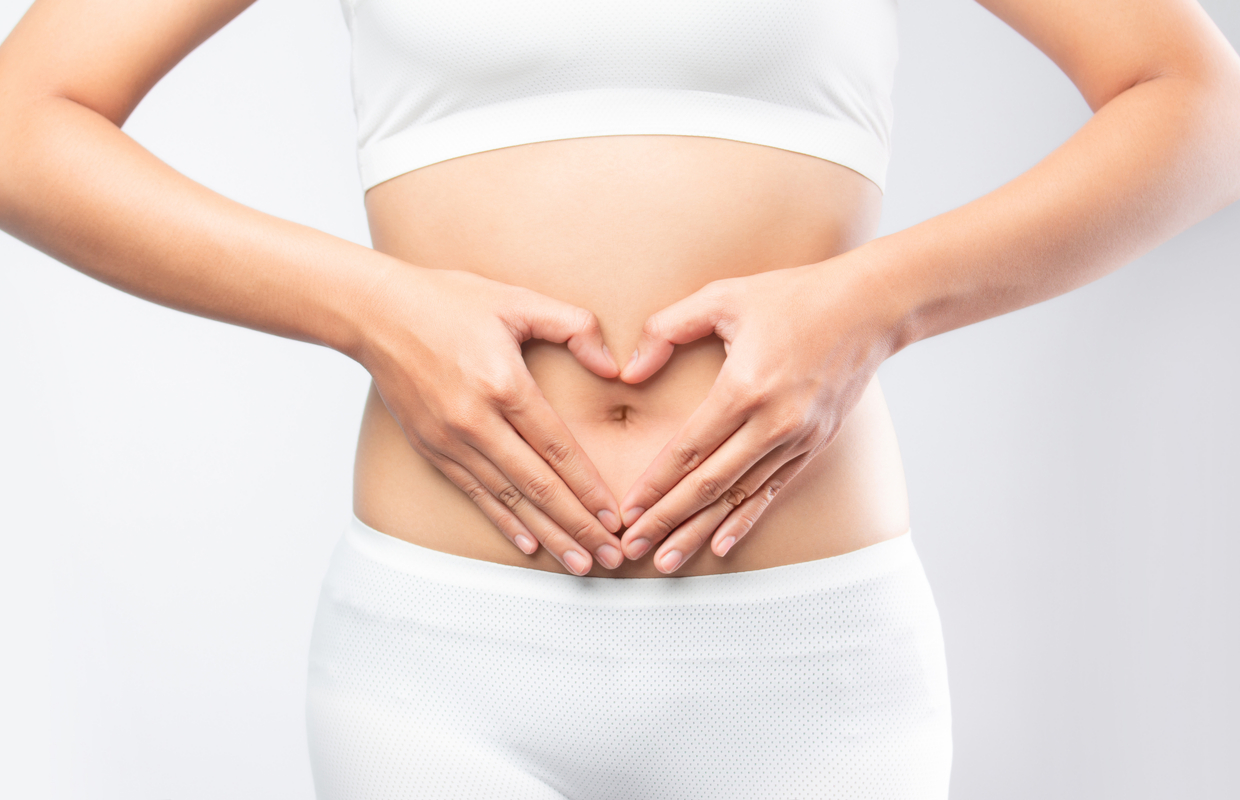Did you know, your gut health can impact your menopause journey? We take a closer look at the relationship between your hormones and the microbiome, before revealing how to improve your gut health while going through the menopause…
When you’re up and down on the hormonal rollercoaster that is menopause, you probably don’t give much thought to your gut health. But, it turns out that the friendly bacteria in your intestines have a huge impact on just how bumpy that rollercoaster gets.
‘Your microbiome can influence your hormone levels, create hormones and tell your body when to make its own hormones,’ says nutritional therapist Angelique Panagos, author of The Balance Plan (£20, Aster). The natural drop in oestrogen levels as you go through the peri-menopause could affect the balance of the friendly bacteria in your gut, too. And it’s this, according to the experts, that could explain the increase in your risk of problems such as osteoporosis, insulin resistance and obesity post-menopause.
But if your gut health affects your hormone levels and your hormone levels affect your gut health, where should you start? ‘You need to help your microbiome thrive,’ says Angelique. ‘Poor gut health can have a knock-on effect for all kinds of hormone-related problems and it has a huge impact on your health and your moods. Get on top of your bugs and you should see an improvement in your mood swings, anxiety, sleep and energy levels.’

What is the gut microbiome?
Your gut microbiome is made up of trillions of bacteria and fungi that live mainly in your colon. Your particular collection of friendly bacteria is unique to you and is a product of both your environment and your lifestyle. Multiple studies show that the richer the diversity of your microbiome the lower your risk of disease.
What does the gut microbiome do?
There is one particular set of gut flora, known as your estrobolome, that is especially important for keeping you hormonally balanced. It helps your body to metabolise oestrogen, getting rid of the oestrogens you don’t need and helping you hang on to the ones you do need.
‘These bacteria in your microbiome do this by digesting the food you eat. As they do this they produce bioactive compounds called postbiotics,’ says Dr Jenna Macciochi, Doctor of Immunology at the University of Sussex.
‘These regulate many functions in your body including mood, metabolism and immune function. They also control the levels of oestrogen circulating in your body by producing an enzyme – beta-glucuronidase.’
The relationship between the microbiome and hormones
When your gut microbiome is healthy, the estrobolome produces just the right amount of beta-glucuronidase to maintain your oestrogen balance. But if your gut is struggling, your levels of beta-glucuronidase may be unbalanced too. This produces either a deficiency or an excess of free oestrogens floating around your body. If these levels are constantly up and down you’re more likely to experience symptoms such as weepiness, water retention, hot flushes and mood swings.
Can poor gut health cause menopausal weight gain?
Gaining weight around your middle is another symptom of the imbalance between your friendly bacteria and your oestrogen levels according to a study in the European Journal of Clinical Nutrition. The scientists found that you can combat central weight gain by eating a diet rich in phytoestrogens (plant oestrogens), such as those found in soy foods.
And it isn’t just oestrogen that’s kept in balance by your gut. ‘Other hormones such as your thyroid hormones (to balance your metabolism), neurotransmitters such as serotonin and dopamine (your happy hormones) and melatonin (your sleep hormone) are all affected by your gut health,’ says Angelique. All of these hormones could affect how you fare in the run-up to menopause. ‘Thankfully though there is a lot you can do restore harmony to your gut and hormones,’ she says.

The relationship between gut health and menopause
Even if you don’t struggle with fluctuating hormone levels it’s still worth making sure your microbiome is in great shape as you head towards menopause. An unbalanced microbiome that leads to altered oestrogen levels could have longer-term health implications.
‘It is linked to your risk of many other conditions of ageing including cardio-metabolic diseases such as heart disease, type 2 diabetes and osteoporosis,’ says Dr Macciochi. Some studies even go so far as to suggest a link between the health of our estrobolome and our risk of oestrogen-related cancers such as breast cancer and ovarian cancer.
How to improve your gut health during menopause
Thankfully, a few simple steps could help you to rebalance your microbiome and improve your gut health while going through the menopause…
1. Eat a diverse diet rich in plant-based foods
The first step to improving your gut health during the menopause is altering your diet. ‘Your microbiome eats what you eat so it’s important to feed it right,’ says Dr Macciochi. ‘Eating a diverse diet will help to produce a diverse microbiome.’
Try to eat a wide range of whole, natural foods. Keep processed and junk foods to a minimum. ‘Your gut bugs thrive on fibre from fruit and vegetables, pulses and beans, which they use to create pharmacologically active compounds from plants called phytonutrients. These help to support your body as you age,’ says Dr Macciochi.
Make sure you get your five portions of fruit and vegetables a day. Also, try to include as many different colours as possible to ensure you’re getting a wide range of nutrients. ‘It’s also a good idea to add in complex carbohydrates, lean proteins and healthy fats from avocadoes, oily fish and nuts and seeds,’ says Angelique.
Eating whole foods and reducing your intake of sugary, processed meals and snacks will also help to balance your blood sugar. ‘This is important because it stabilises your insulin levels and helps to balance your cortisol, androgens and sex hormones. In turn, this will help to help level your moods, improve your sleep and fight tummy fat,’ says Angelique.
‘Try to include plenty of prebiotic and probiotic foods too. Prebiotics are fibre-rich foods that “fertilise” your gut bacteria. You can find them in onions, leeks, garlic, pulses, bananas, nuts, seeds, cabbages and apples. Probiotic foods are fermented and contribute to the healthy bacteria in your gut. They include, kefir, kimchi, miso and fermented vegetables.’
2. Exercise regularly to reduce your stress levels
‘If you’re stressed, blood is diverted away from your digestive tract and your microbiome. This makes digestion harder. It can also cause food to sit and ferment, leading to bloating and cramping,’ says Angelique. Plus, restricted blood flow to your gut could lead to a reduction in your microbial diversity, lowering numbers of friendly flora, and creating conditions that encourage unfriendly strains to thrive, according to a study in the journal Brain, Behaviour and Immunity.
Regular exercise is another important de-stressor for your gut. Moving your body helps to relieve stress, increase your energy levels and help with elimination. That last one is important for hormone balance, according to Angelique.
‘Regular bowel movements help to move spent hormones out of your body. Basically, a poop a day helps to keep your hormones at bay’. If you don’t already exercise, then start small and build up. Try to commit to daily movement, even if it’s just a brisk stroll around the park.

3. Make time to relax and prioritise sleep
Finally, try to make time for yourself. ‘Rest and relaxation should be a priority, not a luxury,’ says Angelique. ‘Try to do something for you each and every single day. Even if it’s having a soak in the bath, reading your favourite book, or popping on a face mask. Also, make sure you give yourself time to get a good night sleep.’
Making sleep a priority is important because just a few nights of distrupted sleep can have a negative effect on your microbiome. This is according to a study by Swedish researchers. ‘The most important thing to remember is to be kind to yourself. Remember that working to optimise your hormones is about making a series of gentle, consistent changes over time,’ says Angelique. ‘You’re looking to create a lifestyle that achieves hormonal balance through consistency, not perfection. It’s important to recognise and accept that this might take time.’
Related: Gut health and Parkinson’s disease – is there a link?
Words: Rebecca Speechley | Images: Shutterstock








